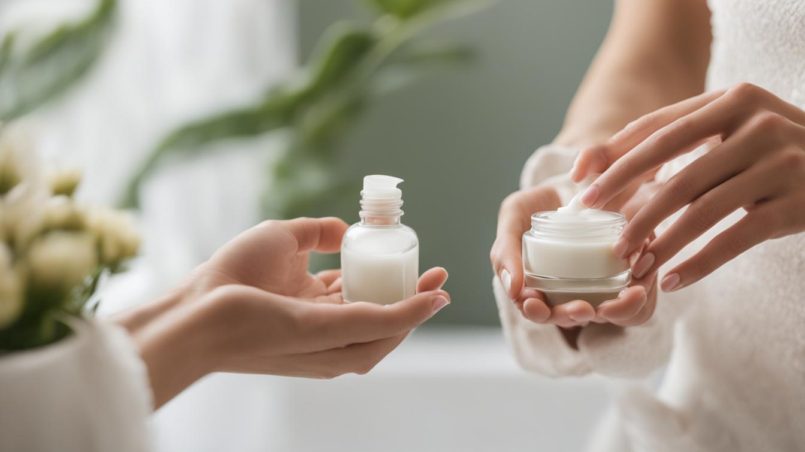If you have sensitive skin, you know how challenging it can be to find skincare products that won’t cause redness, irritation, or dryness. Your skin may feel tight, dehydrated, and react to active ingredients in conventional skincare products. The good news is that there are solutions specifically designed to address sensitive skin concerns.
To care for your sensitive skin, it’s important to prioritize calming, soothing, and hypoallergenic formulations. Look for skincare products with gentle ingredients that are known for their anti-inflammatory and hydrating properties. Aloe vera, hyaluronic acid, vitamin E, and essential oils can provide the much-needed relief and nourishment for your delicate skin.
Key Takeaways:
- Sensitive skin can have various manifestations, including redness, irritation, dryness, and flaky patches.
- Choosing skincare products specifically formulated for sensitive skin is crucial to prevent further sensitization.
- Look for products with calming ingredients like aloe vera, hyaluronic acid, and vitamin E.
- Avoid irritants such as fragrances, dyes, sulfates, drying alcohols, silicones, and preservatives.
- Consulting with a dermatologist can provide personalized recommendations for your sensitive skin needs.
Causes of Sensitive Skin
Different factors can contribute to sensitive skin, including environmental factors, genetic factors, and skincare ingredients. Understanding the causes of sensitive skin can help you make informed choices when it comes to your skincare routine.
Environmental Factors
Environmental factors such as sun exposure, wind, cold temperatures, and heat can all contribute to skin sensitivity. The sun’s UV rays, for example, can damage the skin’s protective barrier and lead to irritation and redness. Similarly, extreme weather conditions like strong winds or cold temperatures can strip the skin of its natural oils and moisture, leaving it vulnerable to dryness and sensitivity.
Genetic Factors
Sensitive skin can also have a genetic component. Some individuals may be more prone to sensitivity due to their genetic makeup. This can manifest as conditions like atopic dermatitis, which is characterized by dry, itchy, and inflamed skin. If you have a family history of sensitive skin or skin conditions, you may be more likely to experience sensitivity yourself.
Skincare Ingredients
The skincare products you use can also play a role in causing sensitivity. Certain ingredients commonly found in soaps, detergents, cosmetics, and lotions can be harsh and irritating to the skin. Fragrances, dyes, certain sulfates, drying alcohols, silicones, and preservatives are all common irritants. It’s important to read product labels carefully and avoid these ingredients if you have sensitive skin.
“Understanding the causes of sensitive skin can help you make informed choices when it comes to your skincare routine.”
| Environmental Factors | Genetic Factors | Skincare Ingredients |
|---|---|---|
| Sun exposure | Family history of sensitive skin | Fragrances |
| Wind | Skin conditions like atopic dermatitis | Dyes |
| Cold temperatures | Certain sulfates | |
| Heat | Drying alcohols | |
| Silicones | ||
| Preservatives |
By understanding the causes of sensitive skin, you can take proactive steps to minimize irritation and maintain a healthy skin barrier. Avoiding environmental triggers, choosing gentler skincare products, and adopting a consistent skincare routine can all help keep your sensitive skin calm and comfortable.
Best Skincare Products for Sensitive Skin
When it comes to caring for sensitive skin, choosing the right skincare products can make all the difference. Fortunately, there are many brands that offer a wide range of products specifically designed to cater to the needs of sensitive skin. These products are formulated with gentle and soothing ingredients to minimize the risk of irritation and provide nourishment for your delicate skin.
Here are some highly recommended skincare products for sensitive skin:
Gentle Cleansing Water:
La Roche-Posay Micellar Cleansing Water
Hydrating Face Creams:
TONYMOLY Wonder Ceramide Mochi Collection
First Aid Beauty Ultra Repair Cream
Vichy Aqualia Thermal Face Cream Moisturizer
Cetaphil Hydrating Moisturizing Cream
Nourishing Night Cream:
CeraVe Skin Renewing Night Cream
Hydrating Anti-Aging Serum:
Image Skincare Vital C Hydrating Anti-Aging Serum
Soothing Face Serum:
Aveeno Triple Oat Serum
Calming Skin Recovery Cream:
Tolerance Control Soothing Skin Recovery Cream
Moisture-Boosting Facial Oil:
HERBIVORE Botanicals Emerald Deep Moisture Glow Oil
These products are known for their effectiveness in nourishing and hydrating sensitive skin without causing any irritation or discomfort. They contain gentle ingredients such as natural extracts, ceramides, niacinamide, hyaluronic acid, chamomile, and aloe that help soothe and calm the skin.
Remember to always check the ingredients list when choosing skincare products for sensitive skin. Look for products that are free from harsh chemicals, fragrances, and other potential irritants. It’s also a good idea to patch test new products on a small area of your skin before incorporating them into your skincare routine.
By using these gentle and effective skincare products, you can take care of your sensitive skin and maintain a healthy and radiant complexion.
How to Shop for Sensitive Skin Products
When it comes to shopping for sensitive skin products, there are a few key tips to keep in mind. By following these shopping guidelines, you can ensure that you find products that are gentle and suitable for your skin’s needs.
1. Look for Ingredients that Address Sensitive Skin
When reading product labels, pay attention to the ingredients. Look for ingredients that can specifically address sensitive skin concerns. Some key ingredients to look out for include:
- Ceramides: these help strengthen the skin’s natural barrier and improve moisture retention.
- Niacinamide: known for its soothing and anti-inflammatory properties, it can help calm sensitive skin.
- Hyaluronic Acid: provides hydration without causing irritation or heaviness.
- Chamomile: a natural ingredient with calming and anti-inflammatory properties.
- Aloe: known for its soothing and hydrating properties, it can help alleviate redness and irritation.
2. Patch Test Before Regular Use
Before incorporating a new product into your skincare routine, it’s important to perform a patch test. This involves applying a small amount of product to a small area of your skin, such as behind your ear or on your inner arm. Wait for 24 to 48 hours to observe any potential allergic reactions or irritations. If there are no adverse effects, you can proceed with regular use.
3. Avoid Common Irritants
To prevent skin irritation, it’s crucial to avoid products that contain common irritants. These can include fragrances, dyes, sulfates, drying alcohols, silicones, and preservatives. Opt for products that are labeled as hypoallergenic, fragrance-free, and specifically formulated for sensitive skin.
4. Check for Dermatologist Recommendations and Customer Reviews
When shopping for sensitive skin products, it can be helpful to check for dermatologist recommendations and customer reviews. Dermatologists can provide valuable insights and recommend specific products that are suitable for sensitive skin. Additionally, reading reviews from customers with similar skin concerns can give you a better understanding of whether a product is effective and well-tolerated by sensitive skin.
Remember, everyone’s skin is unique, so what works for one person may not work for another. It may take some trial and error to find the perfect products for your sensitive skin. By following these shopping tips and paying attention to the ingredients, you can make informed decisions and establish a skincare routine that works best for you.
Skincare Routine for Sensitive Skin
A gentle skincare routine is crucial for individuals with sensitive skin. By incorporating the right products and practices into your daily and nighttime routine, you can effectively address your skin’s needs and maintain its health and balance.
Daily Skincare Routine
- Cleanse: Start your skincare routine by gently cleansing your face with a mild, fragrance-free cleanser. Look for products specifically formulated for sensitive skin to avoid any potential irritants.
- Serum: After cleansing, apply a soothing face serum that is gentle and non-irritating. Look for serums that contain ingredients like chamomile, aloe vera, or hyaluronic acid to provide hydration and calm any redness or inflammation.
- Moisturize: Follow up with a rich, conditioning, and restorative daily moisturizer. Look for formulations that include ingredients like ceramides, niacinamide, or hyaluronic acid to lock in moisture and strengthen your skin’s barrier.
Nighttime Skincare Routine
- Double Cleanse: In the evening, start by double cleansing your skin to remove any makeup, dirt, or pollutants accumulated throughout the day. Begin with an oil-based cleanser to break down makeup, followed by a gentle cleanser.
- Treatment: After cleansing, apply any specific treatment products, such as a targeted serum or spot treatment, if needed. Choose products that address your individual concerns, such as redness, dryness, or sensitivity.
- Night Cream: Finish your nighttime routine by applying a nourishing and hydrating night cream. Look for formulations that contain ingredients like shea butter, olive oil, or jojoba oil to replenish and rejuvenate your skin while you sleep.
In addition to your daily and nighttime skincare routine, it’s important to use makeup products that are suitable for sensitive skin. Opt for hypoallergenic and fragrance-free options that are gentle and non-irritating.
For individuals with hypersensitive skin or persistent skin concerns, seeking the advice of a dermatologist is highly recommended. A dermatologist can provide personalized recommendations, identify any underlying skin conditions or contact allergies, and guide you in the best practices for caring for your sensitive skin.

Remember, consistency and a gentle approach are key when it comes to taking care of your sensitive skin. By following a suitable skincare routine and using products designed for your unique needs, you can keep your skin healthy, balanced, and free from irritation.
Natural Skincare Remedies for Sensitive Skin
If you have sensitive skin, you may find relief in natural remedies that are gentle and soothing. These remedies can help calm inflammation, reduce redness, and provide hydration. Here are some DIY skincare remedies for sensitive skin:
Aloe Vera Gel
Aloe vera gel is a natural moisturizer that can help soothe sensitive skin and reduce inflammation. Apply a thin layer of pure aloe vera gel to your skin to provide instant hydration and a cooling sensation. Aloe vera gel can also help heal minor cuts and wounds.
Honey

Honey has antimicrobial and anti-inflammatory properties, making it beneficial for sensitive skin. Apply a thin layer of raw honey to your face and leave it on for 10-15 minutes. Rinse off with lukewarm water to reveal smoother and calmer skin.
Chamomile Tea
Chamomile tea can be used as a toner or in face masks to reduce redness and soothe irritation. Brew a cup of chamomile tea, let it cool, and use a cotton pad to apply it to your face as a toner. You can also mix chamomile tea with honey or aloe vera gel to create a calming face mask.
Oatmeal
Oatmeal can be used in face masks to moisturize and gently exfoliate sensitive skin. Mix finely ground oatmeal with a small amount of water to create a paste. Apply the oatmeal mask to your face and leave it on for 10-15 minutes. Gently massage your skin in circular motions before rinsing off with lukewarm water.
Coconut Oil

Coconut oil can provide deep hydration and create a protective barrier on the skin. Warm a small amount of coconut oil between your palms and gently massage it onto your face. Leave it on overnight for intense moisturization. Note: Coconut oil may not be suitable for all individuals, so it’s important to do a patch test before using it on your face.
These natural remedies can be a great addition to your skincare routine for sensitive skin. However, it’s important to remember that everyone’s skin is unique, and what works for one person may not work for another. If you experience any discomfort or irritation, discontinue use and consult with a dermatologist.
Skincare Tips for Sensitive Skin
Taking specific precautions can help individuals with sensitive skin. By following these skincare tips for sensitive skin, you can effectively care for your skin and minimize irritation and discomfort.
Avoid hot water: Hot water can strip the skin of its natural oils and exacerbate sensitivity. Instead, opt for lukewarm water when cleansing your face.
Choose gentle cleansers: Harsh cleansers with added fragrances and chemicals can irritate sensitive skin. Look for gentle cleansers specifically formulated for sensitive skin.
Pat dry: After cleansing, avoid rubbing your face with a towel as it can cause friction and irritation. Gently pat your skin dry with a soft towel instead.
Protect from the sun: Sun exposure can trigger flare-ups for sensitive skin. Wear sunscreen with at least SPF 30 and protective clothing to shield your skin from harmful UV rays.
Avoid excessive exfoliation: While exfoliating can remove dead skin cells, overdoing it can aggravate sensitive skin. Limit exfoliation to once or twice a week using a gentle exfoliant.
Use non-irritating skincare products: Look for skincare products specifically formulated for sensitive skin. Avoid ingredients like fragrances, alcohol, and harsh chemicals that can cause irritation.
| Skincare Tips for Sensitive Skin |
|---|
| Avoid hot water |
| Choose gentle cleansers |
| Pat dry |
| Protect from the sun |
| Avoid excessive exfoliation |
| Use non-irritating skincare products |
Following these skincare tips for sensitive skin can help you effectively care for your skin and maintain its health and balance.
Professional Advice for Sensitive Skin
When it comes to caring for sensitive skin, seeking professional advice from a dermatologist is crucial. If you experience persistent redness, stinging, rashes, or flaky skin, it’s important to consult with a skincare expert who can provide personalized recommendations and solutions. Dermatologists are highly trained medical professionals specializing in skin health and can help you identify any underlying skin conditions or contact allergies that may be exacerbating your sensitivity.
By visiting a dermatologist, you can benefit from their expertise in sensitive skin care and receive customized treatment options tailored to your specific needs. They can prescribe suitable medications, creams, or ointments to alleviate symptoms and soothe your skin. Moreover, dermatologists can guide you on the best practices for caring for sensitive skin, including recommendations for skincare routines and lifestyle adjustments.
Additionally, dermatologists are well-versed in the latest skincare advancements and can recommend specific products that are suitable for sensitive skin. They have extensive knowledge of ingredients and can help you navigate through the vast array of skincare products available on the market. With their professional guidance, you can make informed decisions and choose the best products that will nourish and protect your sensitive skin.
Remember, professional advice from a dermatologist is essential for individuals with sensitive skin who are seeking expert care and guidance. They can provide you with the confidence and peace of mind knowing that you are taking the necessary steps to keep your skin healthy, balanced, and protected.
Note: The image above is for illustrative purposes only and does not depict any particular dermatologist or skincare treatment.
Conclusion
Taking care of sensitive skin requires a gentle and mindful approach. By using skincare products with calming, soothing, and hydrating properties, you can effectively alleviate redness, irritation, and dryness. Look for products that contain natural ingredients like aloe vera, chamomile, and hyaluronic acid to nourish and protect your skin.
When introducing new products into your skincare routine, remember to patch test them first to ensure they don’t cause any adverse reactions. Avoiding common irritants, such as fragrances, dyes, and sulfates, can also help prevent skin sensitivity. Consistency is key, so make sure to follow a daily skincare routine with suitable products.
While these tips can help you care for your sensitive skin, it’s important to seek professional advice when needed. Dermatologists can provide personalized recommendations based on your specific skin condition and help identify any underlying issues. Additionally, incorporating natural remedies like aloe vera gel, honey, and chamomile tea can provide extra nourishment and relief for your sensitive skin.
With the right approach and a well-rounded skincare routine, you can achieve healthy and balanced skin, even if you have sensitivity. Remember to listen to your skin’s needs and adjust your routine accordingly. By prioritizing gentle care and using suitable products, you can maintain the health and beauty of your sensitive skin.
FAQ
What are some gentle skincare solutions for sensitive skin?
Gentle skincare solutions for sensitive skin include calming, soothing, and hydrating formulations. Look for products with cooling ingredients like aloe vera, hyaluronic acid, vitamin E, and essential oils.
What are the causes of sensitive skin?
Sensitive skin can be caused by environmental factors such as sun, wind, cold, and heat. Ingredients in everyday products like soaps, detergents, cosmetics, and lotions can also contribute to sensitivity. Sensitive skin can also be genetic, manifesting as atopic dermatitis.
What are the best skincare products for sensitive skin?
Some recommended skincare products for sensitive skin include La Roche-Posay Micellar Cleansing Water, TONYMOLY Wonder Ceramide Mochi Collection, First Aid Beauty Ultra Repair Cream, Vichy Aqualia Thermal Face Cream Moisturizer, Cetaphil Hydrating Moisturizing Cream, CeraVe Skin Renewing Night Cream, Image Skincare Vital C Hydrating Anti-Aging Serum, Aveeno Triple Oat Serum, Tolerance Control Soothing Skin Recovery Cream, and HERBIVORE Botanicals Emerald Deep Moisture Glow Oil.
How should I shop for sensitive skin products?
When shopping for sensitive skin products, look for ingredients like ceramides, niacinamide, hyaluronic acid, chamomile, and aloe. Patch test new products before regular use and avoid common irritants like fragrances, dyes, sulfates, drying alcohols, silicones, and preservatives. Checking for dermatologist recommendations and reading customer reviews is also helpful.
What should be included in a skincare routine for sensitive skin?
A gentle skincare routine for sensitive skin should include cleansing with a mild, fragrance-free cleanser, followed by the application of a soothing face serum. Moisturizing with a rich and conditioning daily moisturizer and night cream is important. It’s also crucial to use makeup products that are suitable for sensitive skin.
Are there any natural skincare remedies for sensitive skin?
Yes, there are several natural remedies that can help soothe sensitive skin. Aloe vera gel can be used as a natural moisturizer and to calm inflammation. Honey has antimicrobial and anti-inflammatory properties, making it beneficial for sensitive skin. Chamomile tea can be used as a toner, and oatmeal can be used in face masks to moisturize and exfoliate gently. Coconut oil can provide hydration and create a barrier on the skin. Patch test before trying any DIY remedies.
What are some skincare tips for sensitive skin?
Some skincare tips for sensitive skin include avoiding hot water, harsh cleansers, and over-washing the face. Use lukewarm water, gentle cleansers, and pat the skin dry with a soft towel. Protect the skin from sun exposure with sunscreen and protective clothing. Avoid excessive exfoliation and use non-irritating skincare products.
Should I seek professional advice for sensitive skin?
Yes, if you have persistent redness, stinging, rashes, or flaky skin, it’s recommended to seek professional advice from a dermatologist. They can provide personalized skincare recommendations, prescribe suitable treatments, and identify any underlying skin conditions or contact allergies. They can also guide you on the best practices for caring for sensitive skin and recommend specific skincare products.
What is the conclusion for skincare for sensitive skin?
Taking a gentle approach to skincare is essential for individuals with sensitive skin. Use calming, soothing, and hydrating products with natural ingredients. Patch test new products, avoid common irritants, and follow a consistent skincare routine. Seek professional advice when necessary and incorporate natural remedies for additional care. With the right approach, individuals can achieve healthy and balanced skin.







